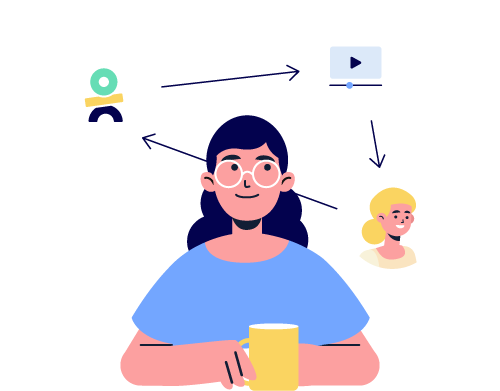Do you build a wall around you if you make a mistake? Maybe you don't want anybody to know about it? And do you just continue steadily with your work tasks?
If that is a general tendency for you and the rest of the employees at your workplace, you will have a hard time learning together and managing your work tasks more effectively.
What is organizational learning?
Organizational learning takes place when companies and institutions learn from their mistakes (Elkjær 2017) and when you create, maintain, and transfer knowledge internally in the organization. This is important for learning and development in all companies.
If you have a culture where colleagues aren’t keen on sharing their mistakes so that others can avoid them, it means that you have a culture that restricts organizational learning. These mechanisms are also called organizational defensive routines (Argyris 1999).
On the other hand, if have an open culture where no one is judged, Then you have a culture that promotes organizational learning. That’s why you will be better at performing your work tasks together more effectively – for the benefit of the whole organization.
Openness is generally a good thing if you want to promote organizational learning and develop your competencies. But how can you bring the openness more into play specifically?

How to Promote Organizational Learning
-
Encourage Knowledge Sharing. Establish digital platforms and mechanisms for employees to share their knowledge and experiences. This can include digital collaboration tools, a learning platform, internal social networks, regular team meetings, or dedicated knowledge-sharing sessions. Recognize and reward individuals who actively contribute to knowledge sharing.
A lot of knowledge can be broken down into smaller bites and learning modules can be created in your LMS system. This way you can send out and share the knowledge with whomever needs the information. Plus, it is easy and quick to update the information.
Foster a Culture of Psychological Safety. Create an environment where employees feel safe to share their ideas, opinions, and mistakes without fear of judgment or repercussions. Encourage open communication and respectful feedback, emphasizing that learning is valued over blame.
This can of course be easier said than done and it takes time. One way to start is to lead by example and encourage open communication and feedback. - Promote Cross-Departmental Collaboration. Encourage collaboration and knowledge exchange among different departments or teams. Foster interdisciplinary projects or initiatives that require employees to work together across functional boundaries.This can facilitate the transfer of knowledge, ideas, and best practices throughout the organization.
-
Embrace Failure as a Learning Opportunity. Create a culture that views failure as a stepping stone to improvement rather than a reason for punishment. Encourage employees to reflect on failures, extract valuable lessons, and share those insights with others. Celebrate learning from failures as a means of fostering growth and resilience.

- Evaluate and Learn from Projects and Initiatives. Regularly evaluate the outcomes of projects and initiatives, both successful and unsuccessful. Encourage team discussions to identify lessons learned, areas for improvement, and insights that can be applied to future endeavors. Use these evaluations to refine processes, optimize performance, and enhance organizational learning.
- Support Continuous Improvement. Foster a mindset of continuous improvement by encouraging employees to seek innovative solutions and challenge the status quo. Implement mechanisms for collecting feedback and suggestions from employees, such as surveys, suggestion boxes, or regular check-ins. Actively review and implement valuable ideas to drive organizational learning and growth.
Wanna know more? Read this article about effective knowledge sharing in your organization.

